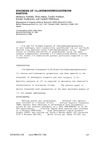 28 citations,
April 2010 in “British Journal of Dermatology”
28 citations,
April 2010 in “British Journal of Dermatology” Genetic marker rs12558842 strongly linked to male hair loss.
 23 citations,
March 2019 in “Environmental Chemistry Letters”
23 citations,
March 2019 in “Environmental Chemistry Letters” Cyclodextrins improve how steroid drugs work and are used in marketed medications and environmental applications.
 13 citations,
January 2007 in “International journal of pharmaceutics”
13 citations,
January 2007 in “International journal of pharmaceutics” Papain cream removes hair better than papain gel, causing hair follicles to widen and skin to thicken.
 13 citations,
April 1994 in “Journal of Investigative Dermatology”
13 citations,
April 1994 in “Journal of Investigative Dermatology” Androgen receptors found in monkey scalps, similar to humans, affect hair growth.
 9 citations,
March 2011 in “Oxidative stress and disease”
9 citations,
March 2011 in “Oxidative stress and disease” Some herbal treatments are effective for skin disorders, but more research and regulation are needed.
 9 citations,
February 2011 in “Revista Brasileira de Farmacognosia”
9 citations,
February 2011 in “Revista Brasileira de Farmacognosia” Tridax procumbens plant parts boost immune response in mice.
 8 citations,
September 2017 in “Journal of Natural Medicines”
8 citations,
September 2017 in “Journal of Natural Medicines” Applying an extract from Perilla frutescens helps hair grow and fights the effects of hair loss hormones.
 7 citations,
June 1989 in “Steroids”
7 citations,
June 1989 in “Steroids” Researchers successfully made new compounds for hormone level tests, but one attempt led to an unexpected product, correcting a past error.
 3 citations,
September 1975 in “Journal of animal science/Journal of animal science ... and ASAS reference compendium”
3 citations,
September 1975 in “Journal of animal science/Journal of animal science ... and ASAS reference compendium” Pigs can make some essential fats and don't need them all in their diet to grow and stay healthy.
 1 citations,
November 2018 in “bioRxiv (Cold Spring Harbor Laboratory)”
1 citations,
November 2018 in “bioRxiv (Cold Spring Harbor Laboratory)” Signals from skin cells controlled by Rac proteins help turn certain precursor cells into white fat cells.
 1 citations,
March 2011 in “Infertility”
1 citations,
March 2011 in “Infertility” Hormone imbalances from the pituitary, thyroid, and adrenal glands can cause infertility, but treating these disorders can improve fertility.
 December 2022 in “Journal of applied biological chemistry”
December 2022 in “Journal of applied biological chemistry” Betula platyphylla extract, particularly the H3-2 fraction, may help treat hair loss by promoting cell growth and inhibiting a hair loss-related enzyme.

Wild African goats have genetic adaptations for surviving harsh desert conditions.
 January 2018 in “Elsevier eBooks”
January 2018 in “Elsevier eBooks” The document concludes that alopecia has significant social and psychological effects, leading to a market for hair loss treatments.
 January 2013 in “Transactions of the Materials Research Society of Japan”
January 2013 in “Transactions of the Materials Research Society of Japan” CMADK reduces hair damage from bleaching and permanent waving.
 1039 citations,
February 2009 in “Nature Reviews Molecular Cell Biology”
1039 citations,
February 2009 in “Nature Reviews Molecular Cell Biology” Skin stem cells are crucial for maintaining and repairing the skin and hair, using a complex mix of signals to do so.
 508 citations,
February 2007 in “Cell”
508 citations,
February 2007 in “Cell” Epithelial stem cells are crucial for tissue renewal and repair, and understanding them could improve treatments for damage and cancer.
 320 citations,
December 2018 in “Frontiers in Immunology”
320 citations,
December 2018 in “Frontiers in Immunology” Changing how mesenchymal stromal cells are grown can improve their healing abilities.
 265 citations,
July 2012 in “Cell”
265 citations,
July 2012 in “Cell” The study found that sweat glands contain different types of stem cells that help with healing and maintaining healthy skin.
 249 citations,
April 2002 in “The FASEB journal”
249 citations,
April 2002 in “The FASEB journal” Human skin can make serotonin and melatonin.
 202 citations,
June 2005 in “Aaps Pharmscitech”
202 citations,
June 2005 in “Aaps Pharmscitech” Lecithin organogels could be good for applying drugs to the skin because they are stable, safe, and can improve drug absorption.
 136 citations,
March 1996 in “Journal of the American Chemical Society”
136 citations,
March 1996 in “Journal of the American Chemical Society” Finasteride effectively blocks enzyme causing male pattern baldness.
 101 citations,
October 2016 in “Nanomedicine: Nanotechnology, Biology and Medicine”
101 citations,
October 2016 in “Nanomedicine: Nanotechnology, Biology and Medicine” Fullerenes show potential in skin care but need more safety research.
 93 citations,
April 2003 in “Proceedings of the National Academy of Sciences of the United States of America”
93 citations,
April 2003 in “Proceedings of the National Academy of Sciences of the United States of America” Fatty acid transport protein 4 is essential for skin and hair development.
 86 citations,
August 2011 in “Toxicological sciences”
86 citations,
August 2011 in “Toxicological sciences” TCDD speeds up skin barrier formation by increasing certain gene expressions.
 85 citations,
January 2007 in “Journal of Drug Targeting”
85 citations,
January 2007 in “Journal of Drug Targeting” Liposomes better deliver minoxidil for hair loss treatment than niosomes.
 81 citations,
February 1997 in “Journal of Investigative Dermatology”
81 citations,
February 1997 in “Journal of Investigative Dermatology” Minoxidil boosts hair growth by activating PGHS-1.
 78 citations,
February 2004 in “British Journal of Dermatology”
78 citations,
February 2004 in “British Journal of Dermatology” Melatonin helps hair growth in women with hair loss.
 76 citations,
June 2015 in “Journal of biomedical science”
76 citations,
June 2015 in “Journal of biomedical science” Mutations in Gasdermin A3 cause skin inflammation and hair loss by disrupting mitochondria.
 72 citations,
December 2012 in “Expert Opinion on Drug Delivery”
72 citations,
December 2012 in “Expert Opinion on Drug Delivery” Niosomes are promising for skin drug delivery, offering benefits like improved drug penetration and stability.






























